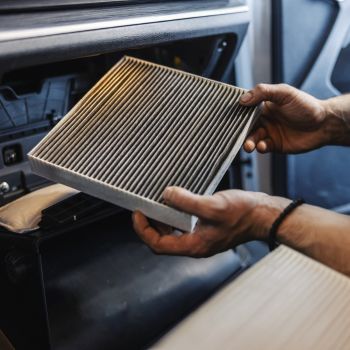 Most vehicles come with two essential air filters: one for the engine and another for the cabin. The engine air filter cleans the air that enters the engine, preventing dirt and dust from damaging internal components. Meanwhile, the cabin air filter keeps harmful particles, pollen, and allergens out of the passenger area, ensuring cleaner and healthier air inside your car.
Most vehicles come with two essential air filters: one for the engine and another for the cabin. The engine air filter cleans the air that enters the engine, preventing dirt and dust from damaging internal components. Meanwhile, the cabin air filter keeps harmful particles, pollen, and allergens out of the passenger area, ensuring cleaner and healthier air inside your car.
Over time, these filters become clogged with dirt, dust, and other debris. This buildup can reduce airflow, affect engine performance, and even impact fuel efficiency. If not maintained, it could lead to more serious issues down the line. Depending on the type, some filters are reusable and can be cleaned, while others need to be replaced regularly. Knowing when to service or replace them is key to keeping your vehicle running smoothly.
The Importance of Air Filters
The cabin air filter plays a crucial role in maintaining good indoor air quality. When it’s dirty, it can no longer trap allergens effectively, leading to stuffy, smelly, or even unhealthy air inside your car. This can cause discomfort, especially for those with allergies or respiratory issues.
On the other hand, the engine air filter protects the engine from harmful particles that could cause damage. A clogged engine filter restricts airflow, which may lead to poor engine performance, increased fuel consumption, and even overheating. It also affects how well the engine cools itself, which can result in long-term mechanical problems if ignored.
These filters are typically made of pleated paper, synthetic materials, or fabric-like substances. They are designed to capture fine particles as small as 5 to 10 microns while allowing sufficient airflow. Regular maintenance ensures they continue to function efficiently and protect both your car and its occupants.
How Often Should You Replace Your Air Filters?
As a general guideline, most manufacturers recommend replacing your air filters every 12,000 to 15,000 miles or once a year, whichever comes first. However, this can vary depending on driving conditions and environment. For example:
- Frequent stop-and-go driving
- Living in areas with high pollution or dust
- Driving on unpaved roads or in off-road conditions
- Exposure to high humidity or frequent rain
- Regularly driving in hot climates
In such cases, you may need to replace your filters more often to maintain optimal performance and air quality.
Signs That You Need a New Air Filter
Your car might give you subtle hints that it's time for a new filter. Some vehicles have an indicator light or sensor that changes color when the filter needs replacing. If yours doesn’t, here are some signs to watch for:
- Decreased fuel efficiency (fewer miles per gallon)
- Engine misfires, rough idling, or stalling
- Check Engine light turns on
- Failing an emissions test
- Unusual hissing or whistling sounds when the engine is off
- Slow or uneven acceleration
If the cabin filter is dirty, you might notice unpleasant odors, such as moldy or musty smells, or feel less airflow coming from the vents. These are clear indicators that it’s time for a replacement.
Don’t ignore these signs—keeping your air filters clean and in good condition can improve your car’s performance, save you money on fuel, and make your driving experience more comfortable. If you're unsure about your filters’ condition, it's always a good idea to have a professional inspect them. Schedule a service at DaSilva’s Auto Body today to ensure your vehicle is running at its best.
Dust Collector,Shell Making Machine,Slurry Mixing Machine,Shell Making Equipment
Dongying Fuhao Precision Casting Science & Technology Co.,Ltd , https://www.fh-cast.com